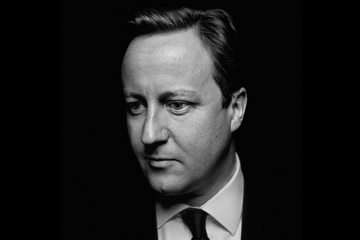
(3 of 5)
Cameron says on Europe he's "been pretty consistent. Hardheaded, practical engagement--not [a] starry-eyed dreamer about the European Union, but recognizing it is in Britain's interest to get the best out of this organization." Euroskeptic Tories have cause to disagree. They remember the smooth young orator who gave a bravura speech at the party's 2005 annual convention. Cameron won the Tory leadership in no small part because of his undertaking to withdraw the Conservative Party from the EPP, the grouping of moderate, center-right parties in the European Parliament, the E.U.'s legislative arm. That decision caused him problems later, when he led the Tories out of the EPP in 2009, straining relations with German Chancellor Angela Merkel and other EPP members just when he needed a close working relationship with them.
Since then, Cameron has given the Tory right--Euroskeptics and social conservatives--as many reasons to jeer as to cheer. He calculated that his party itself had to transform to attain power, by reaching beyond its base to the center, but he failed to win an outright majority in 2010 and took the Tories into a shotgun wedding with the ardently Europhile, socially progressive Liberal Democrats, just as the euro-zone crisis threatened an unprecedented centralizing of powers in Brussels.
The reason Cameron wasn't able to include his European-referendum promise in the coalition government's latest legislative program, provoking rebellion in his ranks, was that the Lib Dems oppose such a vote. Tory backbenchers mutter that Cameron feels more at home with the Lib Dems than his own kind. The left, meanwhile, portrays him as a Conservative ideologue masquerading as a liberal. Which is the real Cameron? The Prime Minister grimaces at the question. "If you take both these criticisms and work out they can't [both] be right, you end up with a very sensible, practical, hardheaded, proud Brit who does the best for his country."
As a summation of his core beliefs, it's typically vague and doesn't reassure Euroskeptic voters. UKIP, by contrast, offers them lots of red meat, including the promise of an immediate in-or-out referendum on Europe. Like Cameron, whose pledge is intended as the centerpiece of the Conservative manifesto for the 2015 general election, UKIP would actually have to win to make good on its promise. But unlike the Prime Minister, UKIP actually wants a referendum. Cameron until January resolutely resisted opening the question of Britain's E.U. membership. When he finally agreed to the vote, he was gambling that the gesture alone would bring his party to heel and cut the ground from beneath UKIP. A Survation poll published on May 20 shows how badly that gamble misfired. UKIP--its members inevitably nicknamed Kippers after the smoked fish that in less multicultural times regularly graced British breakfast tables--now commands the support of 22% of voters, putting it just two points behind the Tories. The fringe party has yet to win a parliamentary seat but appears on course to draw enough Tory votes to do so in 2015, threatening not just the Conservatives' tenuous grip on power but their centuries-old position as one of three natural parties of government.
